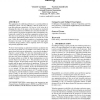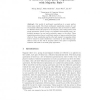135
click to vote
ACMICEC
2003
ACM
15 years 7 months ago
2003
ACM
A multi-agent marketplace, MAGNET (Multi AGent Negotiation Testbed), is a promising solution to conduct online combinatorial auctions. The trust model of MAGNET is somewhat diffe...
128
click to vote
ACMICEC
2003
ACM
15 years 7 months ago
2003
ACM
The aggregation of conflicting preferences is a central problem in multiagent systems. The key difficulty is that the agents may report their preferences insincerely. Mechanism ...
ACMICEC
2003
ACM
15 years 7 months ago
2003
ACM
In this paper we present a B2B integration project, which aims to augment the added value of services instead of improving efficiency by automating processes. This paper introduce...
113
click to vote
ACMICEC
2003
ACM
15 years 7 months ago
2003
ACM
The Platform for Privacy Preferences (P3P) provides a standard computer-readable format for privacy policies and a protocol that enables web browsers to read and process these pol...
105
click to vote
ACMICEC
2003
ACM
15 years 7 months ago
2003
ACM
We develop two algorithms to manage bid data in flexible, multi-unit double auctions. The first algorithm is a multi-unit extension of the 4-HEAP algorithm, and the second is a ...
120
click to vote
ACMICEC
2003
ACM
15 years 7 months ago
2003
ACM
Online auctions are increasingly being used as a medium to procure goods and services. As the number of auction sites increases, however, consumers will inevitably want to track a...
102
Voted
ECWEB
2004
Springer
15 years 8 months ago
2004
Springer
Recommendations in e–commerce collaborative filtering are based on predicting the preference of a user for a given item according to historical records of other user’s prefere...
104
Voted
ECWEB
2004
Springer
15 years 8 months ago
2004
Springer
Our model of multi-party negotiations is a many parties, many issues model. The whole multi-party negotiation consists of a set of mutually influencing bilateral negotiations that...
86
Voted
ECWEB
2004
Springer
15 years 8 months ago
2004
Springer
127
click to vote
ECWEB
2004
Springer
15 years 8 months ago
2004
Springer
This paper presents how text -mining techniques can be used to analyze an enterprise’s external environment searching for competitors, related products and services, marketing st...



